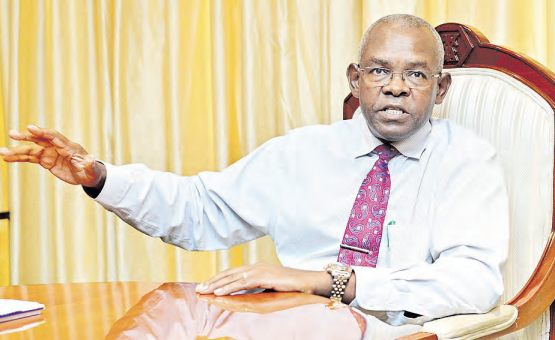

Central Bank of Kenya has cracked the whip on commercial banks over reluctance to pass benefits of lower benchmark rates to borrowers, amidst a widespread cut in deposit rates that is in their favour.
This, even as it moves to address concerns over the soundness of the country’s banking industry CBK governor Kamau Thugge has since summoned CEOs of commercial banks to address “teething issues in the sector, according to insiders, with the government keen to increase lending to both households and businesses in what it believes will stimulate economic activities and growth.
Last Wednesday, CBK said the banking sector remains stable and resilient, dismissing what it termed “false information” that was feared could have triggered panic withdrawals.
CBK is however concerned over failure by some banks to reduce interest rates.
While some had already reduced interest rates after the Central Bank of Kenya (CBK)’s Monetary Policy Committee cut the key lending rate by 0.75 percent, or 75 basis points, from 12.75 percent to 12 percent, on October 8, some banks are till offering loans at exorbitant rates.
“I have scheduled three meeting sessions with all CEOs of commercial banks and mortgage finance company to discuss this important matter….given the criticality of this meeting, I would request that all CEOs attend the meeting in person,” CBK governor Kamau Thugge said in a summon by CBK seen by the Star.
The first meeting took place yesterday with two more scheduled for today and tomorrow at the CBK head office in Nairobi.
CBK is concerned over banks’ speed in cutting deposit rates but slow to lower lending rates in line with the back-to-back cuts in the apex bank’s base rates, which have dropped from a high of 13 per cent in June.
The rates were reduced to 12.75 per cent in August before a further reduction to 12 per cent last month. At the recent launch of the Kenya Bankers Association Inua Biashara Exhibition, there were engagements on the need to spur growth in credit to the private sector, CBK notes.
“This is particularly in light of the falling interest rates following the recent cuts in the Central Bank Rate by the Monetary Policy Committee,” Thugge noted.
The lowering of the CBR came with the drop in inflation which fell to 2.7 per cent in October, down from 3.6 per cent a month earlier.
“The MPC noted the sharp deceleration in credit to the private sector, and the slowdown in growth in the second quarter of 2024, and concluded that there was scope for a further easing of the monetary policy stance to support economic activity,” Thugge had said during the MPC meeting.
Growth in commercial bank lending to the private sector stood at 1.3 per cent in August 2024 compared to 3.7 per cent in July. Growth in local currency-denominated loans stood at 5.2 per cent in August, with the foreign currency-denominated loans, which account for about 26 per cent of total loans, contracting by 10.6 per cent. DTB and Cooperative Bank were the first tier 1 lenders to follow CBK’s order to offer cheaper loans with the two remaining with the cheapest loans among major commercial banks, with overall interest rates of 12.44 per cent and 14.88 per cent as of last month, respectively.
Premier Bank however had the cheapest loans with interests of nine per cent, followed by Access Bank ( 11.42%), Consolidated Bank ( 1 2.44%), while SMEs focused Kingdom Bank had interest rates of 13.99 per cent.
Listed lenders KCB, I&M and Absa had higher interest rates of 16.02 per cent, 18.24 per cent and 20.02 per cent, respectively. Mortgage focused lender-HFC’s rates stood 20.50 while National Bank was offering loans at an ovwerall rate of 16.51 per cent. NCBA last month announced it was lowering lending rates on new shilling-denominated loans to 16.91 percent from 17.5 per cent. On Monday, Equity Bank announced a reduction in interest rates on all new and existing Kenya Shilling-denominated credit facilities, giving borrowers the much needed relief.
“The reduction in our Equity
Bank Reference Rate from 17.83 per
cent to 17.39 per cent is in response
to the MPC’s decision, which aims
to maintain economic stability amid
improving inflation trends and favorable economic indicators,” Group
CEO James Mwangi said.

